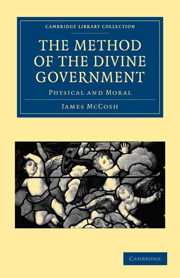Book contents
- Frontmatter
- Contents
- PREFACE TO FIRST EDITION
- PREFACE TO SECOND EDITION
- BOOK FIRST GENERAL VIEW OF THE DIVINE GOVERNMENT AS FITTED TO THROW LIGHT ON THE CHARACTER OF GOD
- BOOK SECOND PARTICULAR INQUIRY INTO THE METHOD OF THE DIVINE GOVERNMENT IN THE PHYSICAL WORLD
- CHAPTER I GENERAL LAWS; OR THE PRINCIPLE OF ORDER
- CHAPTER II PROVIDENCE; OR THE PRINCIPLE OF SPECIAL ADAPTATION
- CHAPTER III RELATION OF THE PROVIDENCE OF GOD TO THE CHARACTER OF MAN
- BOOK THIRD PARTICULAR INQUIRY INTO THE PRINCIPLES OF THE HUMAN MIND THROUGH WHICH GOD GOVERNS MANKIND
- BOOK FOURTH RESULTS—THE RECONCILIATION OF GOD AND MAN
- APPENDIX ON FUNDAMENTAL PRINCIPLES
- REFERENCES TO AUTHORS AND SYSTEMS
CHAPTER I - GENERAL LAWS; OR THE PRINCIPLE OF ORDER
Published online by Cambridge University Press: 29 August 2010
- Frontmatter
- Contents
- PREFACE TO FIRST EDITION
- PREFACE TO SECOND EDITION
- BOOK FIRST GENERAL VIEW OF THE DIVINE GOVERNMENT AS FITTED TO THROW LIGHT ON THE CHARACTER OF GOD
- BOOK SECOND PARTICULAR INQUIRY INTO THE METHOD OF THE DIVINE GOVERNMENT IN THE PHYSICAL WORLD
- CHAPTER I GENERAL LAWS; OR THE PRINCIPLE OF ORDER
- CHAPTER II PROVIDENCE; OR THE PRINCIPLE OF SPECIAL ADAPTATION
- CHAPTER III RELATION OF THE PROVIDENCE OF GOD TO THE CHARACTER OF MAN
- BOOK THIRD PARTICULAR INQUIRY INTO THE PRINCIPLES OF THE HUMAN MIND THROUGH WHICH GOD GOVERNS MANKIND
- BOOK FOURTH RESULTS—THE RECONCILIATION OF GOD AND MAN
- APPENDIX ON FUNDAMENTAL PRINCIPLES
- REFERENCES TO AUTHORS AND SYSTEMS
Summary
The most ignorant and careless observer cannot contemplate the works of nature without discovering many indications of the existence of general laws. Science, in its progress, has been widening the dominion of law, and has detected its presence where the unlearned saw only caprice, and where the piously disposed were accustomed to contemplate the Divine power acting independently of all instrumental causes. It is now acknowledged that there are physical laws determining every “fitful breeze, and every forming cloud, and every falling shower.” But while there is a universal recognition among the reflecting community of the existence of general laws, there is about as universal a confusion of idea as to the nature of these laws. An inquiry into this topic may help to clear away much cloudiness of conception, in which not a few errors are lurking.
“Without going into any subtilties,” says Sir John Herschell, “I may at least be allowed to suggest that it is at least high time that philosophers, both physical and others, should come to some nearer agreement than seems to prevail as to the meaning they intend to convey in speaking of causes and causation. On the one hand, we are told that the grand object of physical inquiry is to explain the nature of phenomena by referring them to their causes; on the other, that the inquiry into causes is altogether vain and futile, and that science has no concern but with the discovery of laws.
- Type
- Chapter
- Information
- The Method of the Divine GovernmentPhysical and Moral, pp. 81 - 161Publisher: Cambridge University PressPrint publication year: 2009First published in: 1850



